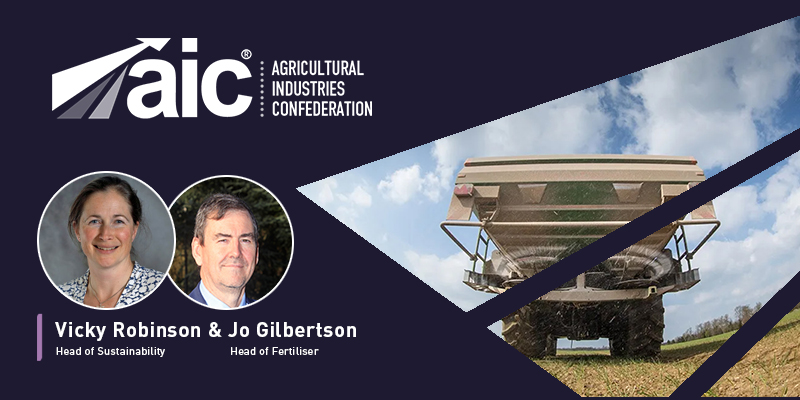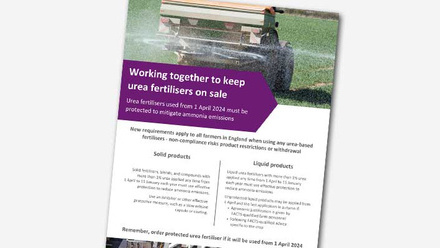Blog: Reducing Ammonia Emissions Through Responsible Fertiliser Use

For National Clean Air Day (19 June 2025), the Agricultural Industries Confederation's Head of Sustainability Vicky Robinson and Head of Fertiliser Jo Gilbertson share how and why farms in England are helping to improve air quality.
Over the past year, farms across England have continued to take significant action to reduce air pollution caused by the use of urea-based fertilisers on crops and grassland.
According to Government data showed that solid urea and urea ammonium nitrate (UAN) fertilisers contributed 5.2% and 2.7% respectively to the UK’s total ammonia emissions.
While urea fertilisers are safe when used responsibly and are essential for promoting healthy crop and grass growth, they emit ammonia gas after application. This gas can combine with nitrogen oxides and sulphur dioxide to form particulate matter, which poses respiratory health risks. Ammonia emissions also contribute to soil acidification and the enrichment of water bodies with nutrients, a process known as eutrophication.
Proactive Industry-Led Solution
To address this, the Joint Urea Stewardship Programme was introduced on 1 April 2024. This industry-led initative (sometimes referred to within the industry as "Option 4") was implemented following agreement between the Government and key agricultural organisations, including the Agricultural Industries Confederation (AIC), and farming unions.
Under this programme, solid, liquid, blended, and compound fertilisers containing more than 1% urea applied between 1 April and 15 January each year must now include effective protection to reduce ammonia emissions.
This effective protection may mean using an inhibitor with the fertiliser, which not only helps to stop the ammonia gases from being emitted into the air but also enhances plant nutrient uptake.
This voluntary ammonia mitigation commitment became part of the Red Tractor farm assurance scheme standards, meaning it now forms part of the regular inspections that farms receive.
Strong Results and High Compliance
Since its implementation, the agricultural industry, working in collaboration with farming representative organisations and Red Tractor partners has successfully rolled out a programme that has reduced ammonia emissions during the controlled period by 70%.
Red Tractor, through its licensed certification bodies, began assessing standards related to the use of urea fertilisers from 1 April 2024. According to topline data from over 28,500 assessments, non-conformance was recorded in only around 90 cases. These instances primarily involved the application of uninhibited liquid or solid urea outside the permitted window of 15 January to 31 March without proper agronomic justification.
Each non-conformance was identified post-application through audit trails, such as cropping plans, purchase records, or stored product checks, and was resolved by the member. In many cases, corrective evidence included agronomic advice from a FACTS-qualified advisor or completion of the BASIS Urea course. This high level of compliance further demonstrates the sector’s commitment to environmental stewardship and responsible fertiliser use.
A Collaborative Success
This achievement is the result of years of collaboration. Since 2021, AIC and its partners have worked closely with the Government to develop practical alternatives the initially proposed ban on urea fertilisers. A move that would have severely impacted fertiliser supply and food production, threatening the UK’s food security.
Instead, the industry's proactive approach maintains farmers' access to these vital fertilisers by giving the Government confidence that they are being used responsibly and therefore a ban isn't necessary.
The initiative has also helped the agricultural sector contribute meaningfully to the UK’s legally binding air quality targets for ammonia emissions - part of the Government’s Clean Air Strategy - contributing to the drive for cleaner air for everyone.
Looking Ahead
The Joint Urea Stewardship Programme demonstrates how coordinated action can contribute to environmental targets while supporting agricultural productivity. As the UK continues to work toward its Clean Air Strategy commitments, the farming industry’s role remains an important part of the broader effort to improve air quality.








